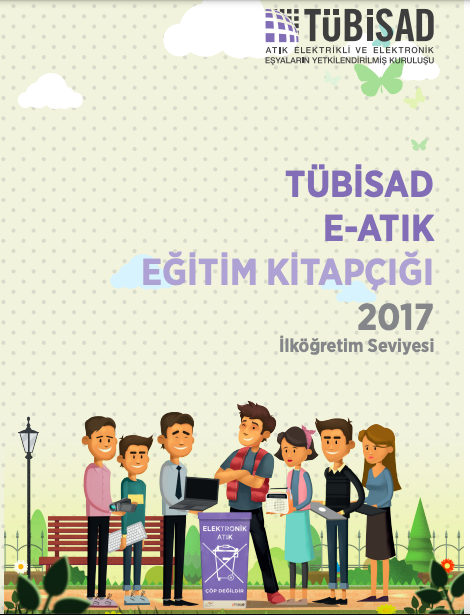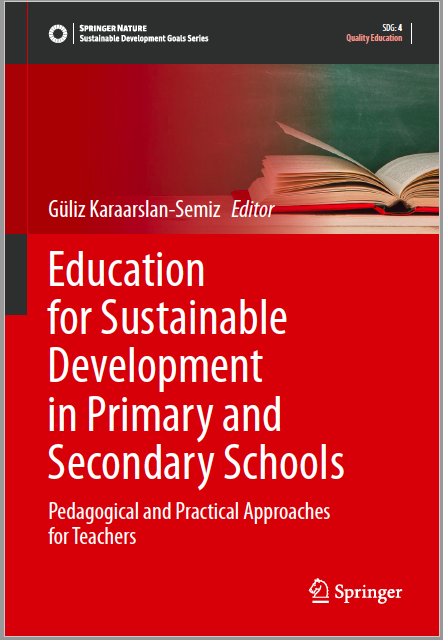Araştırma Makaleleri (Research Papers)
Systems thinking in Education
- Karaarslan-Semiz, G.,* & Teksöz, G. (2023). Tracing system thinking skills in science curricula: A case study from Turkey. International Journal of Science and Mathematics Education. Link
- Karaarslan-Semiz, (2021). Systems thinking research studies in science and sustainability education: A theoretical note. In E. Jeronen (Ed.). Transition to quality education (pp. 39-54). Switzerland: MDPI Publishers. Link
- Karaarslan-Semiz, G.,* & Teksöz, G. (2020). Developing the systems thinking skills of pre-service science teachers through an outdoor ESD course. Journal of Adventure Education and Outdoor Learning, 20 (4), 337-356. Link
- Karaarslan-Semiz, G.,& Teksöz, G. (2019). Sistemsel düşünme becerilerinin tanımlanması, ölçülmesi ve değerlendirilmesi üzerine bir çalışma: Kavram haritaları. Başkent Üniversitesi Eğitim Fakültesi Dergisi, 6(1), 111-126. Link
- Education for Sustainability
- Karaarslan, G., & Teksöz, G. (2016). Integrating sustainable development concept into science education program is not enough; we need competent science teachers for education for sustainable development–Turkish experience. International Journal of Environmental and Science Education, 11(15), 8403-8424. Link
- Karaarslan-Semiz, G.,* İşler-Baykal (2020). Middle school pre-service mathematics teachers’ opinions related to mathematics education for sustainability. Eurasian Journal of Educational Research, 89. 111-136. Link
Environmental Education
- Çakır-Yıldırım, B., & Karaarslan-Semiz, (2022). Üç aşamalı ekolojik ayak izi tanı testinin Türkçe’ye uyarlanması . Ahi Evran Üniversitesi Kırşehir Eğitim Fakültesi Dergisi , 23 (2).Link
- Karaarslan-Semiz, G. (2021). An investigation on primary school pre-service teachers’ perceptions and intentions related to outdoor education. Mehmet Akif Ersoy Eğitim Fakültesi Dergisi , 57, 01-25.Link
- Çakır-Yıldırım, B., & Karaarslan-Semiz, G. (2019). Future teachers’ sustainable water consumption. A test of the value-belief-norm theory. Sustainability, 11(6), 1558. Link
- Karaarslan-Semiz, G., & Çakır-Yıldırım, B. (2019). Is my footprint too big? Exploring the ecological footprint concept with high school students. Science Activities. Projects and Curriculum Ideas in STEM Classrooms, 55 (3-4), 104-114.Link
- Karaarslan, G., Sungur, S., & Ertepınar, H. (2014). Developing pre-service science teachers’ self-determined motivation toward environment through environmental activities. International Journal of Environmental and Science Education, 9(1), 1-19.Link
- Karaarslan, G., Ertepınar, H., & Sungur, S. (2013). Use of self-determination theory to support basic psychological needs of pre-service science teachers in an environmental science course. Environmental Education Research, 19(3), 342-369.Link
Nature-Based Education
- Karaarslan-Semiz, G.,* & Temiz, Z. (2021).Turkish pre-service early childhood education teachers’perceptions and practices regarding nature-based teaching in practicum experience. Australian Journal of Environmental Education, 37. Link
- Yılmaz, S., Temiz, Z., & Karaarslan-Semiz, G. (2018). Children’s understanding of human-nature interactions after a folk storytelling session. Applied Environmental Education and Communication, 19(1), 88-100.Link
- Temiz, Z., & Karaarslan-Semiz, G. (2019). En iyi öğretmenim doğa: Okul öncesinde doğa temelli eğitim uygulamaları projesi kapsamında hazırlanan öğretmen etkinlikleri. İnsan ve Toplum Bilimleri Araştırmaları Dergisi, 8 (1), 314-331.Link
- Çakır, B., Karaarslan, G., Şahin, E., & Ertepınar, H. (2015). Adaptation of nature relatedness scale to Turkish. [İlköğretim Online], Elementary Education Online, 14(4), 1370-1383.Link
Science Education
- Karaarslan-Semiz, G., Çakır-Yıldırım, B., Tuncay-Yüksel, B., Öztürk, N., & Irmak, M. (2023). What can be learned from pre-service teachers’ intentions to vaccinate against COVID-19 and relevant factors for future crises? A cross-sectional survey research. Journal of Turkish Science Education, 20(3), 567-586. Link
- Irmak, M., Öztürk, N., Tuncay-Yüksel, B., Çakır-Yıldırım, B., & Karaarslan-Semiz, G. (2023). Turkish pre-service teachers’ informal reasoning regarding COVID‑19 vaccination and its relation to new media Literacy. Science & Education. Link
- Karaarslan, G. & Sungur, S. (2011). Elementary students’ self-efficacy beliefs in science: Role of grade level, gender, and socio-economic status. Science Education International, 22 (1), 72-79. Link
Kitap Bölümleri (Book Sections)
Outdoor Education
- Karaarslan-Semiz, G. (2021). Sınıf dışında eğitim. K. Bilican & B. Şenler (Eds.). İlkokulda fen öğretimi. (pp. 335-359). Ankara: Vizetek.
Nature Based Education
- Temiz, Z., Karaarslan-Semiz,, & Yılmaz, S. (2019). Nasreddin Hodja and Walnut Tree. A Turkish indigenous story about human-nature interaction. R. Aghasaleh. Children and mother nature: Storytelling for a glocalized environmental pedagogy (pp. 9-16). Netherlands: Brill-Sense Publisher. Link
Environmental and Sustainability Education
- Karaarslan–Semiz, G. & Çakır-Yıldırım, B. (2021). Çevre ve sürdürülebilirlik için eğitim. Yeni yaklaşımlar ve uygulamalar . Z. Savaşan, Ç. Söker & F.H. Yılmaz (Eds.). Çevre hukuku ve politikaları (pp.433-450) Ankara: Seçkin Yayıncılık.
- Karaarslan–Semiz, G. (2020). Çevresel değerler ve çevre etiği . R. Olgan (Ed.). Erken çocukluk döneminde çevre eğitimi (pp.41-56). Ankara: Pegem.
- Karaarslan-Semiz, G. (2019). Enerji kaynakları ve geri dönüşüm . G. Hastürk (Ed.). Çevre eğitimi. (pp.193-222). Ankara: Anı Yayıncılık.
- Karaarslan-Semiz, G., & Yılmaz, S. (2018). Okul öncesinde çevre eğitimi. A. Parlak-Rakap (Ed.). Erken çocukluk döneminde fen eğitimi, (sf-207-235). Ankara: Eğiten Kitap.
Etkinlik Kitabı
Karaarslan Semiz, G. (2017). TÜBİSAD-Boğaziçi Üniversitesi, E-atık eğitim kitapçığı. Link
Editörlük
- Karaarslan-Semiz, G. (Ed.) (2022). Education for Sustainable Development in Primary and Secondary Schools: Pedagogical and Practical Approaches for Teachers. Springer Nature: Switzerland. Link
About the book
This book provides teachers with pedagogical approaches and practical applications to implement Education for Sustainable Development (ESD), and with assessment strategies to evaluate the learning outcomes of ESD in primary and secondary education. In addition to appropriate pedagogical approaches for ESD, the book also presents practical examples that teachers can use as a guide in their classes. The pedagogical approaches related to ESD not only aim to facilitate sustainability knowledge, but also promote attitudes, new perspectives, values, skills and competencies related to sustainability. Thus, holistic and transformative approaches are embraced to develop a deeper understanding of sustainability, values, respect towards the environment, connection to nature, systems thinking to understand complex problems, exhibiting responsible behaviours for sustainability and promoting action competence for sustainable development.


